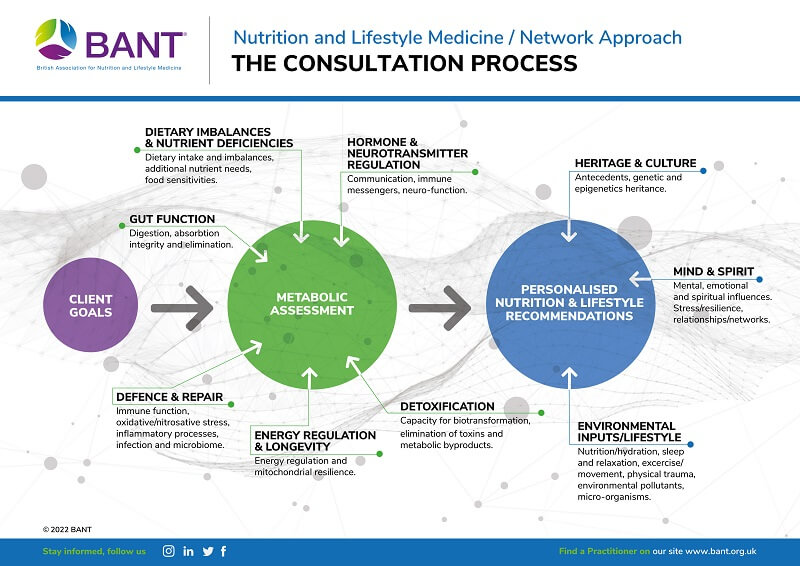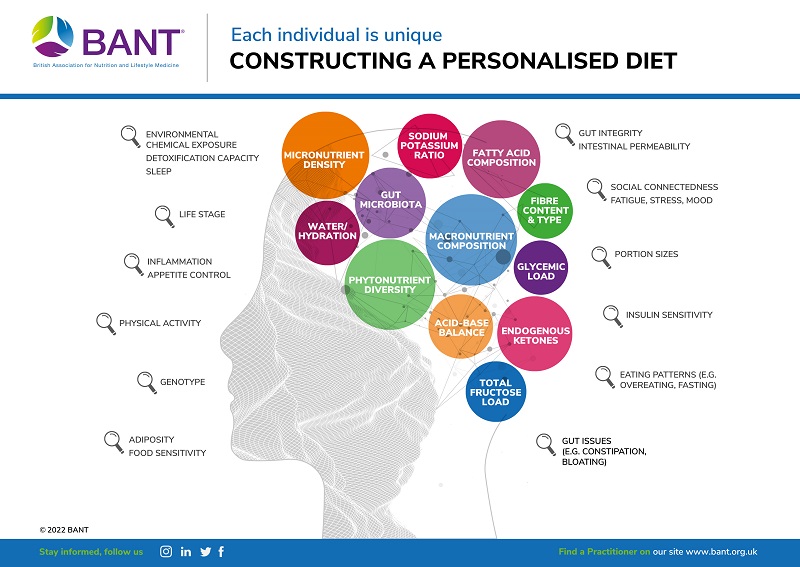YOU are at the centre of personalised care for improved wellbeing
Nutritional therapy is the application of nutrition and lifestyle medicine sciences in the promotion of health, peak performance and individual care.
Registered Nutritional Therapy Practitioners assess and identify potential nutritional imbalances and understand how these may contribute to an individual’s symptoms and health concerns.
Practitioners consider each individual to be unique and recommend personalised nutrition and lifestyle programmes rather than a ‘one size fits all’ approach.
Personalised nutrition is tailored specifically for you, taking into account your health journey, your health goals and dietary preferences. The practitioner may use functional tests to inform the recommendations that are based on your unique biological individuality.
Personalised nutrition consultations are relevant for individuals with chronic conditions, such as diabetes, obesity, cardiovascular disease, and osteoporosis; anyone with persistent digestive issues or those wishing to support an autoimmune condition, as well as those looking to enhance their health and wellbeing.
BANT practitioners do not diagnose or treat disease, and recommendations are not a replacement for medical advice; practitioners frequently work alongside medical professionals to support individual’s wellbeing.
The field of personalised nutrition is still evolving before truly becoming an integral part of the future healthcare paradigm, and including personalised nutrition guidance and therapeutics, as is discussed in below paper by ANA.
Personalised nutrition is a field that leverages human individuality to drive nutrition strategies that prevent, manage, and treat disease and optimise health…
Nutrition and Health
Nutrients and other food components influence the function of the body, protect against disease, restore health, and determine people’s response to changes in the environment.
As defined by WHO and FAO (Food and Agriculture Organisation of the United Nations) in Guidelines on Nutrition Labelling.
Nutrient means any substance normally consumed as a constituent of food:
(a) which provides energy; or
(b) which is needed for growth, development and maintenance of life; or
(c) a deficit of which will cause characteristic bio-chemical or physiological changes to occur.
Under certain circumstances and in some individuals, diet can be a serious risk factor for a number of diseases. Common dietary chemicals can act on the human genome, either directly or indirectly, to alter gene expression or structure. The degree to which diet influences the balance between healthy and disease states may depend on an individual’s genetic makeup. Some diet-regulated genes (and their normal, common variants) are likely to play a role in the onset, incidence, progression, and/or severity of chronic diseases. Dietary intervention based on knowledge of nutritional requirements, nutritional status, and genotype (i.e. “personalised nutrition”) can be used to prevent, mitigate or cure chronic disease.
BANT members combine a network approach to complex systems, incorporating the latest science from genetic, epigenetic, diet and nutrition research to inform individualised recommendations.
-
- Guidelines on Nutrition Labelling (2021). Codex Alimentarius International Food Standard
- Vorster HH Introduction to Human Nutrition. 2nd Edition. Nutrition Society
- Kaput J & RL (2004) Nutritional genomics: the next frontier in the postgenomic era. Physiological Genomics 16 1666-177
Nutrigenomics
Nutrigenetics and nutrigenomics heralds a new era in the contribution of personal nutrition advice to promote and maintain optimal health through all life stages. Professional dietary and nutritional advice tailored to individual genotype – where complex interactions between diet, nutrition and other lifestyle practices, as well as age, gender and current health status, are translated into protocols – may be termed ‘Nutrigenetic Counselling’.
Nutrigenomics is a study of the effects of food and food constituents on gene expression, and how genetic variations affect the nutritional environment.
Nutrigenomics. The basics by the Nutrition Society.
The new paradigm of personalised precision nutrition with use of nutrigenomics data is emerging. Precision nutrition evaluates one’s DNA along with microbiome and metabolic responses to specific foods and dietary patterns to allow practitioner to recommend the most effective dietary choices for each individual. Members of the public wishing to benefit from nutrigenetic Counselling can be assured of appropriate standards of knowledge and ethical practice of those BANT members that are on BANT Nutrigenetic Counsellor (NgC) Register. To find a practitioner listed on the NgC Register please select NgC as one of the search criteria on the Find a Practitioner page.

